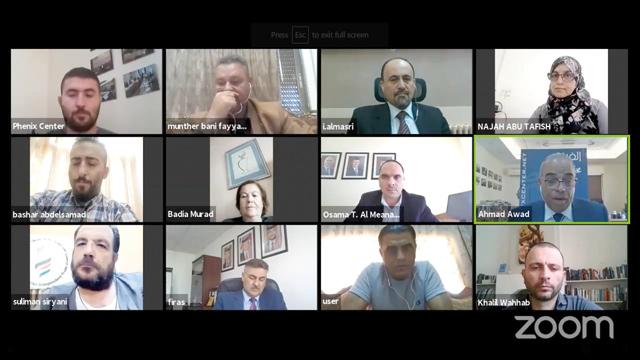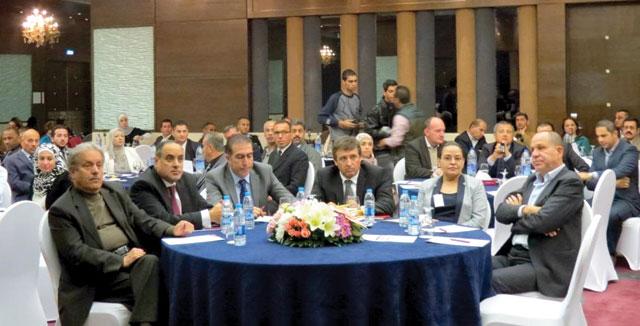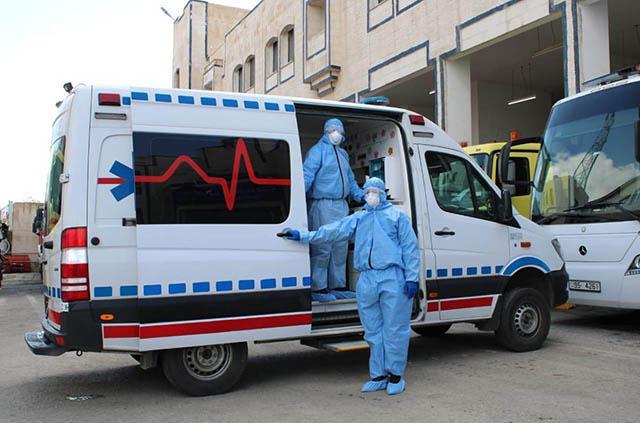You are here
Panel discussion hears of COVID-19 impact on occupational health, safety
By Bahaa Al Deen Al Nawas - Nov 02,2020 - Last updated at Nov 02,2020

The Phenix Centre for Economic Studies held an online panel discussion tackling challenges and gaps in implementing occupational health and safety measures (Photo courtesy of The Phenix Centre for Economic Studies)
AMMAN — The coronavirus crisis has brought challenges and gaps in implementing occupational health and safety measures in economic facilities to the fore, requiring programmes and national policies to ensure a safe workplace, a panel discussion has heard.
The online panel discussion was held by the Phenix Centre for Economic Studies, under the title “Coronavirus impact on occupational health and safety in Jordan”, as part of a series of specialised sessions held by the centre in cooperation with Friedrich Ebert Foundation on COVID-19 and the labour market.
Director of the Phenix Centre Ahmad Awad highlighted the importance of occupational safety as a standard of decent work and fair work conditions as stated in the Constitution, the International Covenant on Economic, Social and Cultural Rights and the Universal Declaration of Human Rights.
Consultant for the Labour Ministry’s Secretary General Najah Abu Tafesh said that the Jordanian policies and standards on vocational health and safety are compatible with international standards, but the challenge lies in actual implementation.
Abu Tafesh said that the crisis has prompted the need to develop policies, noting that the Labour Ministry has been working since the outbreak of the pandemic to ensure that COVID-19 does not spread in business facilities, and is currently revising work policies and measures.
To face the challenges that have risen due to the coronavirus, the ministry has taken news measures, including upgrading the online inspection system to report infections and incidents immediately based on the risks posed in the facility and the number of employees, Abu Tafesh said, noting that this is the time to create a database to record infections and work incidents.
Director of the Occupational Health and Safety Directorate at the Social Security Corporation (SSC) Firas Shatnawi said that safety and health requirements in the workplace “are often dealt with unscientifically and selectively”.
He noted that the corporation sees that most institutions required to commit to occupational health and safety standards do so, but the issue lies in the lack of sustainability due to a shortage of experts in the field.
The corporation is also working on developing measures to remotely evaluate occupational health and safety by using a model that includes related standards, he added.
The participants called for boosting the occupational health and safety standards stated in various Jordanian legislations by intensifying coordination among the concerned entities, especially the ministries of labour and health, the SSC, and the Civil Defence Department, to better monitor and inspect businesses.
Related Articles
AMMAN — Occupational health and safety is among the top priorities of the Labour Ministry, Labour Minister Nayef Istitieh said on Tuesday.Is
The Social Security Corporation (SSC) on Monday said it has so far registered some 440,000 workplace accidents, which resulted in the death of around 2,400 workers and left some 3,800 others with over 30 per cent disabilities.
AMMAN – The Jordan Labour Watch (JLW) on Monday issued a paper that highlights the importance of boosting protection of healthcare workers s



















